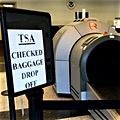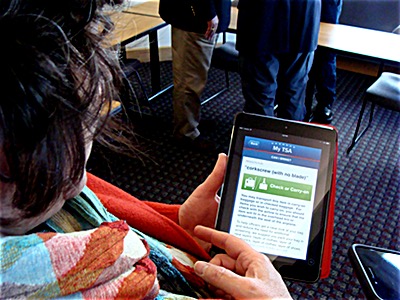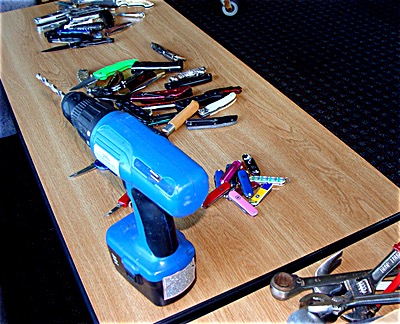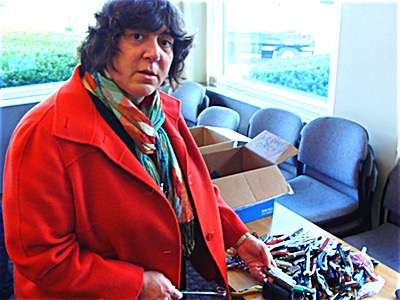- By Dan Veaner
- Around Town
 Print
Print  Anyone who has flown since 9/11 knows the routine. Get in line, take your shoes off, put your items on a conveyor belt to be scanned, and walk through a scanner yourself. How many times has your belt buckle set off an alarm? Travellers see the process as a necessary annoyance, but the truth is that Transportation Security Administration (TSA) agents do find quite a few prohibited items in these scans. Last week the TSA held a press event at the Ithaca Tompkins Regional Airport, where boxes of confiscated items from the Ithaca and Elmira airports were on display.
Anyone who has flown since 9/11 knows the routine. Get in line, take your shoes off, put your items on a conveyor belt to be scanned, and walk through a scanner yourself. How many times has your belt buckle set off an alarm? Travellers see the process as a necessary annoyance, but the truth is that Transportation Security Administration (TSA) agents do find quite a few prohibited items in these scans. Last week the TSA held a press event at the Ithaca Tompkins Regional Airport, where boxes of confiscated items from the Ithaca and Elmira airports were on display."In all likelihood the individual who carried this had no intention of doing harm," said TSA Public Affairs Manager Lisa Farbstein, holding one of hundreds of knives handed over in the past three months. "It's still a prohibited item. You don't know what the guy next to you might be thinking if he sees that he has access to a weapon. Before I worked for TSA I was stopped at checkpoints twice, and I ended up mailing the items back to my house. It's very hard to remember to take a little knife off your key chain."
Do you want to know what is allowed and what is prohibited? If you have a smart phone there's an app for that. Passengers with smart phones may download the free 'My TSA' app. Choose your airport and the app automatically provides a weather update and tells how long the latest security checkpoint wait times lasted. Click the "Can I Bring?" button and type in the item you want to know about -- the app instantly tells you whether it is allowed. If not, it may not be too late to stick it in your checked baggage. The app offers a handy guide to help you get through airport security quickly, and even links to videos that put a face on the TSA and explain what air marshals do.
 There's an app for that! My TSA answers questions before you get to the airport.
There's an app for that! My TSA answers questions before you get to the airport.Most of the items on display were knives, some of them quite small, and tools including wrenches, a trowel for smoothing concrete, a hammer, and an electric drill (the recharging cord was not included). Farbstein says that all the confiscated items on display could have gone in checked baggage, but was confiscated because they are not allowed in the cabin of an airplane. She stressed that many people do not intend to bring these items on a plane. Often people who don't travel regularly simply don't think about items in their pockets that may not be allowed. And with Thanksgiving coming, the busiest travel-time of the year, more passengers are likely to inadvertently bring something that is not allowed through the checkpoint.
"You look at this beautiful fall weather," she said. "Many people are pulling out jackets that they may not have worn for months. They might accidentally have left a knife or a tool in the pockets. They'll be given a choice. They can go put it back in their car. They can hand it off to a non-traveling companion like somebody who is seeing them off, or if somebody dropped them off they can call them and ask them to swing back around so they can hand that knife off to them. They can put it in their checked bag. Some airports have mailing centers. Then your last choice is to voluntarily surrender it to TSA. So it's a fine line: was it confiscated or did you voluntarily surrender it, because you were given a choice of what your options were."
 This is only a fraction of the knives and tools that were surrendered over a three month period at the Ithaca and Elmira airports over a three month period
This is only a fraction of the knives and tools that were surrendered over a three month period at the Ithaca and Elmira airports over a three month periodWhen getting ready to go to the airport some items are obviously not going to be allowed to travel with you. If you are found with firearms or explosives local law enforcement officers are called to confiscate the weapons and decide whether or not you should be arrested.
"Local laws differ," Farbstein said. "We see people come to the checkpoints every day with brass knuckles. If you have a set of brass knuckles with you at LaGuardia or JFK airports, New York City laws are so strict that if you have brass knuckles in your checked bag you will be arrested, because it's illegal to possess brass knuckles in New York City. In most other jurisdictions you can have it in your checked bag."
Other items are not as obvious. If you are bringing home a year's supply of maple syrup from your vacation in Vermont you are certainly going to want to put it in your checked bag. Or it may be more economical to ship it home than to pay a fee for a checked bag. You are only allowed 3.4 ounce (or less) containers of non-flamable liquids in the plane cabin. So if you want a taste of maple syrup on a meal on a long flight, you can have it unless you are a maple syrup glutton.
Of hundreds of knives that have been confiscated at Ithaca and Elmira over the past three months, several had cork screws attached. Corkscrews are permitted, but knives are not.
"If you want to enjoy a nice bottle of wine when you're going on vacation just put it in your checked bag, or use the kind of corkscrew without a knife," Farbstein said. "I have seen my fair share of hatchets, some swords... the first time I saw a hatchet it boggled my mind. And grenades! A lot of military people coming back bring inert or replica grenades as souvenirs. But you can't tell it's inert. A (not-operable) replica firearm is a prohibited item on a plane because it can still cause a panic."
Once you have given an item to the TSA there is no way to get it back. Technically, you are volunteering to surrender the item, because you have opted not to mail it home or leave it with a friend. The items are boxed and handed over to the State. Farbstein says New York doesn't want to deal with confiscated items, so the Pennsylvania General Service Administration collects them about every three months. They go to Harrisburg to be sold in a brick and mortar store and online, with the proceeds going to Pennsylvania.
 TSA Public Affairs Manager Lisa Farbstein with boxes of surrendered contraband
TSA Public Affairs Manager Lisa Farbstein with boxes of surrendered contrabandIt can add up to a lot of merchandise. While three boxes from three months of surrendered items in Ithaca and Elmira may not seem like much, Newark Liberty International Airport in northern New Jersey collects about four tons of the same kinds of tools and knives each year. That doesn't include items like toothpaste or bottled water, which are discarded.
"Security at our smaller airports has to be as good or better than at the larger airports," says Assistant Federal Security Director John McCaffrey. "Once you enter the system here in Ithaca you can go to another airport and travel all day long. So the security here has to be as good or better, because we believe that people who want to cause us harm think security will be less, so this would be a place to get into the system. We want to insure that doesn't happen. And it will not happen here in Ithaca because I have a lot of well-trained people, some of whom have been here from day one in 2002. And the new people we've hired are excellent people."
McCaffrey is responsible for almost 20 employees at the Ithaca Tompkins Regional Airport. He also manages the airports in Rochester, Binghamton, and Elmira. The TSA leases space at each airport and provides its own employees and equipment. A manager and supervisors employed at each airport, and McCaffrey visits every two or three weeks. He is responsible for training and oversight. He says that the stories about TSA agents stealing from passenger bags are rare, and notes that a lot of people other than TSA employees handle baggage.
"I can honestly say we have never had a situation like that here in Ithaca," he says. "I am very proud of the people here. They also work in the community. They live here in the community, so they are responsible to the people in the community. It is also important that we partner with the airport. The partnership that we have with Ithaca is fantastic. We need to work together because good security and good customer service go hand in hand. And we want both."
So if you are taking a plane trip it will really pay to check your pockets before you leave for the airport. And don't pig out on maple syrup, at least not during your flight.
v11i41



